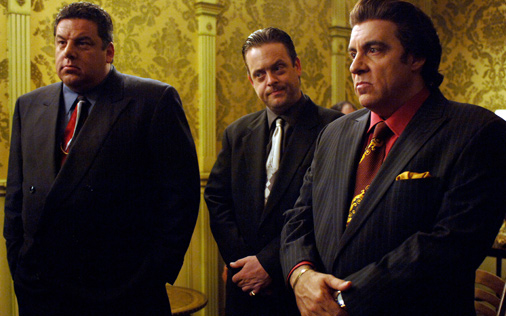… Well, I, for one, have no opinion whether Marxists should be interested in exploitation. If Matt MacKenzie is right, though, perhaps a better question would be, Should exploitation theorists be interested in Marxism?
If critiques of exploitation have heretofore been reserved for the use of state socialism–and Marxism in particular–then, as MacKenzie ably shows, that is the result more by default than by anything inherently statist in the notion of exploitation.
Drawing from the work of Alan Wertheimer, MacKenzie offers a neutral concept of exploitation based on the virtue of fairness, and develops a libertarian conception of exploitation that compares favorably to the more familiar Marxist and Progressive
theories. Thus, through MacKenzie’s insightful analytical work, exploitation
joins class,
oppression,
dialectics,
state capitalism,
and other concepts that left-libertarians have swiped from the theoretical lexicon of the statist Left, and rehabilitated for anti-statist purposes.
Not surprisingly, this dialectical strategy tends to drive both state Leftists and right-wing libertarians bonkers. The statist Left may complain that we are plundering their private property; and the anti-statist Right may complain that we are trying to use the master’s tools to dismantle the master’s house. But the fact is that left-libertarian efforts are, in terms of the history of ideas, more like expropriating the expropriators: if we today sometimes find Marxian notions useful, it is usually because those Marxian notions were themselves swiped from anti-state, pro-market theorists–especially those in the French tradition of industrialism
(out of which arose both Proudhon’s mutualist anarchism, and the radicalized classical liberalism of Bastiat and Gustave de Molinari). Although twentieth century libertarians often identified themselves with the economic Right, and treated complaints of exploitation
with either indifference our outright contempt, nineteenth century libertarians–Benjamin Tucker, for example–drew directly from their industrialist heritage, and wrote extensively, even obsessively, about economic exploitation (or, as Tucker most often called it, usury
), which they saw as pervasive, systemic, destructive, and indeed one of the chief evils for principled libertarians to confront. Thus MacKenzie’s efforts, insofar as they are successful, merely reclaim a word for liberty that we never should have given up to the statists to begin with.
MacKenzie’s careful analysis of the forms of exploitation represents some of the most important work in the essay. He uses this taxonomic backdrop to set out and defend a claim which is far more controversial than it ought to be: that there can be economic relationships which should be condemned as exploitative even though they are both mutually consensual and mutually beneficial (relative to a no-exchange baseline). For any principled libertarian, proving that an economic relationship is consensual is enough to show that no-one has any right to suppress it by force. But if MacKenzie is right, then that is very far from being enough to prove that it should not be condemned and opposed by non-violent means. This point has some import for the applied policy debates that libertarians have often involved themselves in: consider some of the more common libertarian apologetics for third world sweatshops against the objections of Leftists and so-called Progressives;
or, to take another example, for the so-called sex industry
against the objections of radical feminists. Libertarian writers have all too often suggested that if piece work or sex work is agreed to voluntarily, and if it benefits the workers more than other realistically available lines of work would have, then there must be nothing objectionably exploitative about either industry. But if our conception of exploitation
refers not only to respecting rights, but also to questions of fair dealing and to the background conditions that enlarge or constrain the options that are realistically available, the defense of these industries against charges of exploitation must, at the very least, become more sophisticated than they have so far largely been. (I think, in fact, that libertarians who want to defend the so-called sex industry
will find their position almost completely indefensible, and those who want to defend neo-liberal development policies in the third world will find that they have an eminently sensible position in some cases and a ludicrous position in others. But let’s try to postpone those quagmires until at least the question and answer period.)
For now, in the name of diabolical advocacy, I would like to prod MacKenzie a little on the applicability of his notion of fairness in exchange, and thus the applicability of his conception of exploitation. The concern that I’d like to raise, though, is not a logical but rather an epistemological concern. While I know some libertarians who would dig in and argue that there just is no tractable notion of harm, or unfairness, beyond the violation of individual rights–and thus no form of exploitation beyond transactions forced through direct coercion–I think that that claim is simply indefensible in light of any robust theory of human virtues. Here’s an objection I find much more plausible, though: if an economic relationship is both mutually consensual, then it may be very difficult to reliably judge whether or not it is exploitative. There are many virtues that are important for the sustainability of a free society, and while I think fairness is one of the most important of those virtues, tolerance is arguably another; one of the things that libertarians would be wise to cultivate is a certain amount of deference to other people’s judgments about the arrangements that they have voluntarily entered into, and exercising this virtue may make it correspondingly difficult to pick out exploitative economic relationships independently of workers’ decisions about whether or not the arrangement is worth staying in. The example that MacKenzie gives of an exploitative labor contract doesn’t help alleviate the worry, either: if it’s true that a worker making $6.50 an hour might make $11.00 if her bargaining were done against the backdrop of a free market, there remains the question of how we would ever know that this is true. Unless socialist calculation is possible (and it’s not), the hypothetical price of a good or service in a hypothetical free market will never be something that we can quantitatively predict, and orders of magnitude or even directions of change will be, at best, difficult to reliably judge. So might it not be difficult, at best, to identify concrete cases of mutually-consensual-but-exploitative economic relationships? And if so, would that not demand a great deal of caution, if not outright abstention, from putting exploitation
to use in political debates?
I should say two things about this epistemological worry. First, I’m not actually convinced by it myself. Second, if it does have any bite, it’s important to note that the uncertainty involved affects only the question of moral force, not moral weight. Exploitation would be no less bad even if we could never figure out where it does and where it does not occur. Uncertainty may be a reason to qualify your judgments about what is or is not exploitative; it is not a reason to abandon your conviction that exploitation, wherever it may occur, is seriously wrong. Still, this may be an important caveat on the theoretical fruitfulness of exploitation within a pro-market theory; and I’d be interested to hear more about how MacKenzie would deal with it.
The second important claim that MacKenzie sets out to defend is that in the political economy of state capitalism, the exploitation of labor is systemic and pervasive. He favorably cites the work of Benjamin Tucker and Kevin Carson, identifying state violence as the basis of class conflict, and government-enforced monopolies for politically-favored businesses as the root of economic exploitation. It’s important to note that, for MacKenzie as for Tucker and Carson, the exploitative economic relationship may not be itself coercive, even though the conditions that make it exploitative do involve coercion. But while government intervention in the economy is one of the most important ways in which economic options can be restricted, it seems like there are other factors that could have the same effect. For example, if widely-shared cultural prejudices tend to constrain women to lower-wage or no-wage work — such as mothering, housekeeping, nursing, teaching, or acting as a secretary or assistant — when they would otherwise be willing and able to take on better-paying careers, then arguably the sexist cultural norms sustain a form of exploitation that has little if anything to do with government intervention, either directly or indirectly. MacKenzie suggests that he recognizes cases such as these when he says that a genuinely free market will dramatically undermine existing systems of exploitation, but will not be enough
to do them in entirely. Later in the essay he offers a number of reasons why libertarians should be concerned with the forms of exploitation that are closely linked with the background of government privilege and regimentation of the economy; but I wonder whether he thinks that libertarians, qua libertarians, should also be concerned with forms of exploitation where not only the transactions but also the background conditions are non-aggressive, e.g. the result of objectionable but non-coercive cultural norms. And, if so, I’d also be interested to know whether the grounds for libertarian objections to these forms of exploitation, which might persist or even flourish even in a free society, are significantly different from the grounds for libertarian objection to exploitation that directly or indirectly depends on government-enforced privilege.
Third, in a brief but important section of the paper, MacKenzie suggests that where exploitative economic relationships are systemic, prevalent, and seriously morally wrong, it deserves organized political efforts to undermine it. Since he includes non-coercive forms of exploitation in that suggestion, it’s important for him to make it clear that he rejects the identification of politics with the employment of systematic force; thus, while it may be appropriate to enlist organized force in order to suppress coercive forms of exploitation, the sort of politics
involved in undermining the non-coercive forms of exploitation need not involve any use of force at all, either from the government or from organized private efforts. Instead he endorses a conception of politics that I’ve elsewhere characterized in terms of organized efforts to address problems of social coordination through deliberate, co-operative action (rather than through the spontaneous orders that emerge from unintended consequences of private actions). MacKenzie suggests that non-coercive forms of exploitation can appropriately be met through working to develop and maintain anti-explotiative cultural norms, values, and practices,
and supporting efforts to challenge and develop alternatives to exploitative institutions and social relations.
I’d like to hear more about what, in particular, he has in mind here, particularly since he suggests that at least some political activism against exploitation will be necessary even in a genuinely free market. What sort of concrete institutions should we look to, join with, and build up as part of the way forward?
Finally, MacKenzie ends his essay by suggesting several ways in which a critique of exploitation–even when the exploitation is not, in itself, aggressive–might be connected with the libertarian commitment to non-aggression and the decentralization of political power. To frame the discussion he uses five forms of thick
connections between libertarianism and other cultural or political projects in my remarks at this session last year. While I think MacKenzie’s right that a libertarian critique of exploitation involves each of these forms of thickness, I’d actually like to suggest that, when exploitation depends on a background of government intervention to survive, it suggests yet another form of thickness, which addresses the issue more directly but which did not make it into my earlier list of five. (Fortunately the list wasn’t intended to be exhaustive, so I’m happy to welcome one more into the family.) You might gloss the form of thickness here as something like this:
Consequence thickness: Libertarians should commit to opposing
E because even though E is not in itself coercive, (1)
E would be very difficult to carry out or sustain over time if not
for background acts of government coercion that sustain it; and (2) there are
independent reasons for regarding E as an evil.
If aggression is morally illegitimate, then libertarians are entitled not only to condemn it, but also to condemn the destructive results that flow
from statist aggression–even if those results are, in some
important sense, external to the actual coercion. Now, there are a lot of details and caveats that I am skipping over, but I do wonder whether something like consequence thickness,
as I’ve roughly described it, might better explain the immediate concerns that folks like Tucker, Carson, and MacKenzie have about (at least some forms of) exploitation–concerns which seem to arise well before questions about instrumental supports for statism or the ultimate grounds of libertarianism even get raised.




